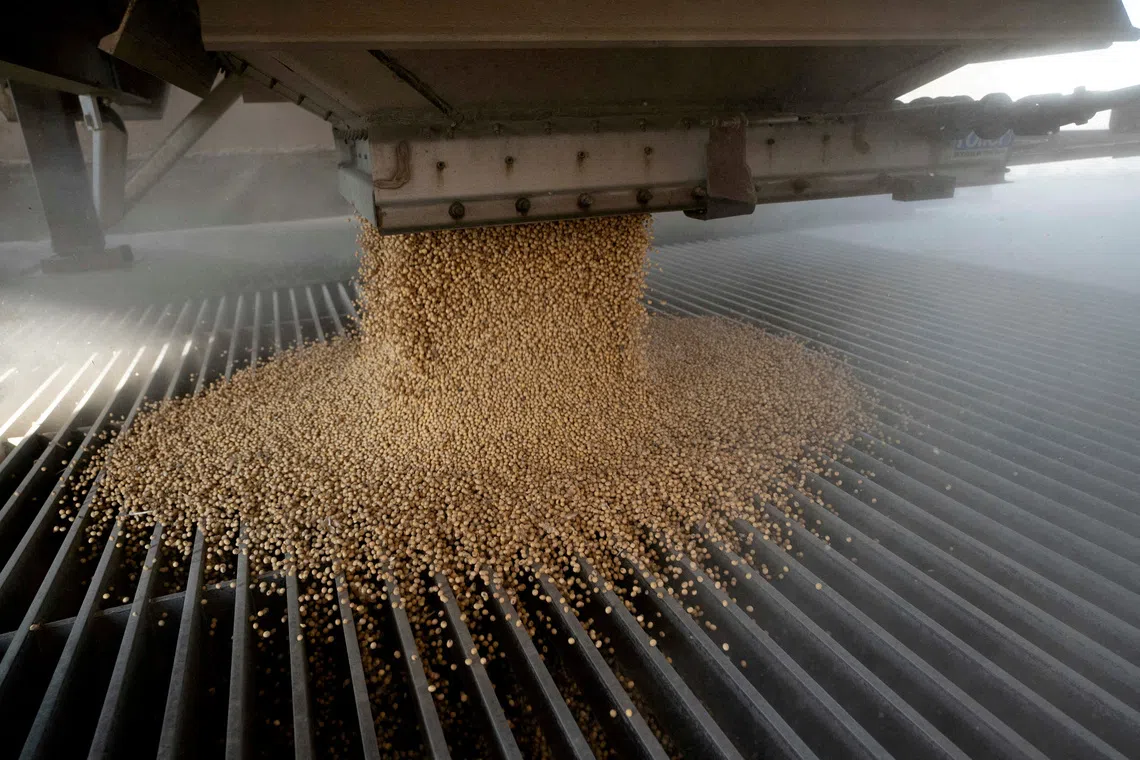Beijing lifts some tariffs on US farm goods but soya beans stay costly
Sign up now: Get ST's newsletters delivered to your inbox

The tariff cut leaves Chinese buyers of US soya beans facing tariffs of 13 per cent, a cost traders said makes US shipments still too expensive for commercial buyers.
PHOTO: REUTERS
Follow topic:
BEIJING – China will suspend retaliatory tariffs on US imports, including duties on farm goods, Beijing confirmed on Nov 5, but imports of US soya beans still face a 13 per cent tariff.
The tariff commission of the State Council, or Cabinet, will scrap duties of up to 15 per cent imposed on some US agricultural goods from Nov 10, while keeping levies of 10 per cent introduced in response to President Donald Trump’s “Liberation Day” duties
Investors on both sides of the Pacific were relieved when Mr Trump met Chinese leader Xi Jinping
Mr Trump and the White House were quick to issue their take on the meeting, but the Chinese side did not immediately give a detailed summary of what it agreed to.
“Broadly, it’s a great sign that the two sides are making rapid progress in putting the deal into effect,” said Ms Even Rogers Pay, a director at Beijing-based analysis firm Trivium China. “It shows they’re aligned and that the agreement is likely to hold up.”
The tariff cut nonetheless leaves Chinese buyers of US soya beans facing tariffs of 13 per cent, a cost traders said makes US shipments still too expensive for commercial buyers, compared with Brazilian alternatives.
“We don’t expect any demand from China to return to the US market with this change,” said one trader at an international trading company. “Brazil is cheaper than the United States and even non-Chinese buyers are taking Brazilian cargoes.”
After the meeting, the White House said China would purchase at least 12 million metric tonnes of US soya beans in the last two months of 2025 and at least 25 million tonnes in each of the next three years.
Beijing has yet to confirm those figures, and traders are watching closely for signs of large-scale purchases.
Cheaper Brazilian beans
Chinese importers recently bought 20 cargoes of cheaper Brazilian soya beans as South American prices eased on expectations of a resumption of US sales to the world’s largest soya bean importer.
Brazilian soya beans for December shipment are quoted at a premium of US$2.25 (S$2.94) to US$2.30 over the January Chicago contract, compared with US$2.40 a bushel being offered for US beans shipped from the US Gulf Coast, traders said.
Before last week’s meeting, state trader Cofco made China’s first purchases from the 2025 US harvest, an act analysts saw as a goodwill gesture.
In 2024, China bought roughly 20 per cent of its soya beans from the US, down from 41 per cent in 2016, the year before Mr Trump’s first presidential term, Customs data showed.
In 2025, China has largely shunned US crops from the autumn harvest due to high tariffs, costing American farmers billions of dollars in lost exports.
In a meeting with a US agricultural trade delegation on Nov 4, China’s senior trade negotiator Li Chenggang attributed “fluctuations” in agricultural trade between the two countries to US tariffs, a summary of the meeting issued by China’s Commerce Ministry showed.
China and the US are “important agricultural trade partners”, Mr Li said, adding that he hoped Washington could work with Beijing to create favourable conditions for cooperation.
China’s Cabinet said it would also suspend for one year the 24 per cent additional tariffs it imposed on US goods in April.
China will also remove or suspend for a year some non-tariff retaliatory measures, including export control measures announced in March and April against some US entities, the Commerce Ministry said on Nov 5. REUTERS

